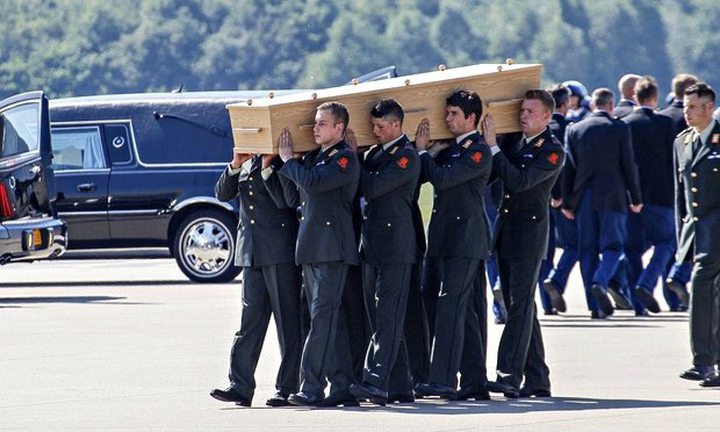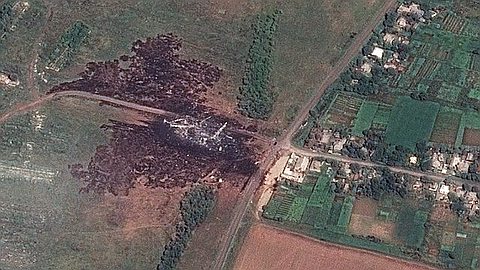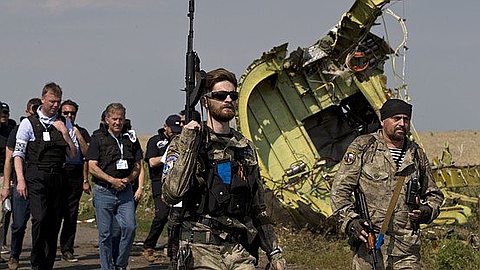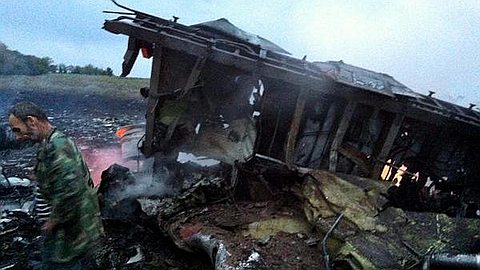Netherlands Mourns as Bodies of MH17 Plane Crash Victims Are Flown Home

As the first coffin was lowered from the planes on the runway, silence fell over Eindhoven military airport. The only sound came from a row of flags whipping in the wind at half mast.
Almost a week after Malaysia Airlines flight MH17 was shot from the skies above Ukraine, 40 bodies arrived on Wednesday in the Netherlands, the country that bore the heaviest toll in the crash.
King Willem-Alexander, Queen Maxima and the Dutch prime minister, Mark Rutte, joined about 1,000 relatives and friends of the victims, who gathered at the airport for a ceremony receiving the two military transport planes.
A lone trumpeter played the Last Post as troops in dress uniform saluted then carried the wooden caskets to a row of hearses. They drove from the airport under military police escort to an army barracks in the central city of Hilversum where forensic experts were waiting to begin the painstaking task of identifying the remains.
Crowds gathered on bridges along the 65-mile route to throw flowers on to the convoy of 40 hearses.
The Dutch government had declared a day of national mourning – the first since the death of Queen Wilhelmina in 1962 – and at 4.07pm a minute's silence was requested across the country.
Two-hundred and ninety-eight passengers and crew were killed when the Boeing 777 flying from Amsterdam to Kuala Lumpar was shot down last Thursdaya week today. The Dutch victims numbered 193. In a nation of just 16 million, few have been unaffected by the disaster.
"Holland is a small country. Everyone knows someone who knows someone who died in the crash," said Peter, who was waiting at Schipol airport. "It has completely changed how we look at the conflict in the Ukraine. Everybody talks about it: neighbours, colleagues, relatives."
Some have inevitably described the biggest aviation disaster in Dutch history as "Holland's 9/11" – a misleading term, not least because the Dutch passengers on flight MH17 are not thought to have been targeted deliberately.
And yet, relations between the Netherlands, home to the majority of the victims, and Russia, accused by some of aiding those who carried out the attack, have in recent days become increasingly fraught.
At Schiphol airport, where on the day after the crash there was still a sense of business carrying on as usual, the mood was now different.
The impromptu shrine outside terminal three, little more than a pile of flowers on Friday, had grown into a sea of bouquets, teddy bears and candles. A letter to one of the victims described him as a "kind, gentle and funny person". The card read: "Even in death he's still a better bloke than all of us."
A woman named Miranda said she had come to the airport specially to lay down flowers. She used to live in Asia, she said, and had a lot of friends who regularly flew with Malaysia Airlines. Something in her attitude, and that of friends, towards Russa, had altered over the last week, she said. "At first we were numb but now there are a lot of angry feelings coming up."
In a widely shared article, the writer Bas Heijne criticised his government's "overtly cautious, strangely muted" response to the disaster. The Dutch, Heijne argued, had always defined themselves somewhere on a scale of pragmatism and moralising, "the Dutch merchant and the Protestant preacher".
In recent years the merchant had gained the upper hand; wagging the finger at countries like Russia, many politicians and businessmen warned, only damaged the economy. So the government had done little to defend itself when Vladimir Putin accused the Netherlands of "promoting paedophilia" or when Dutch Greenpeace activists were arrested for getting too close to a Russian oil platform. "For too long," Heijne wrote, "the Dutch government has coddled the dictator in Moscow."
Other commentators accused Dutch leaders of letting commercial interests get in the way of diplomatic consequences. Last year Russia exported goods and services worth $70bn to the Netherlands. If one country could seriously hurt Putin with trade sanctions, said one analyst in the German newspaper Die Welt, it was the Netherlands.
Frustration with the delayed return of the air crash victims' bodies, and reports in the Dutch media that the crash site had been looted, have affected the country's mood. Where at first there had been calm and composure, there were now also flashes of anger.
Hans de Borst, whose 17-year-old daughter, Elsemiek, died in the crash, wrote an open letter to Putin and pro-Russia separatists, which he put on Facebook: "Aforementioned misters, I hope you're proud to have shot her, amongst other, young life and future. And that you will be able to look at yourself in the mirror tomorrow morning."
Politicians have adjusted their rhetoric accordingly. "All of the Netherlands feels their anger," said Rutte on Sunday, after meeting relatives. "All of the Netherlands feels their deep grief. All of the Netherlands is standing with the next of kin."
Frans Timmermans, the foreign minister, previously hesitant about calling for sanctions, adopted a notably firmer stance at a meeting of ministers in Brussels on Monday: "There is no Dutch blockade of further sanctions. The Netherlands wants the European Union [to make] a united, and also strong, clear, statement against the unrest in eastern Ukraine."
As if to symbolically underline Holland's newfound resolve, the row of flags at Eindhoven airport included a Ukrainian, but no Russian, flag, even though there were no Ukrainian nationals among the victims.
At Schiphol, the Hoogewoud family had stopped off to leave flowers after seeing off their youngest daughter, who was flying to Thailand.
Marloek, the older daughter, said a Spanish friend had sent her a Facebook message after the crash expressing hope that the Dutch government would press charges against the pro-Russian separatists. "But that's not people's first reaction here."
Her father, Ferdinand Hoogewoud, said: "How can we expect politicians in Russia or the Ukraine to take responsibility after two days, when it took the Netherlands two decades to own up to its role in Srebrenica?" Only a day before the MH17 crash a Dutch court had ruled that the government was liable for the deaths of about 300 victims of the 1995 Srebrenica massacre in Bosnia.
"The crisis in the Ukraine used to feel very far away," observed Hoogewoud. "Now it's our problem too. We can't push it away."





